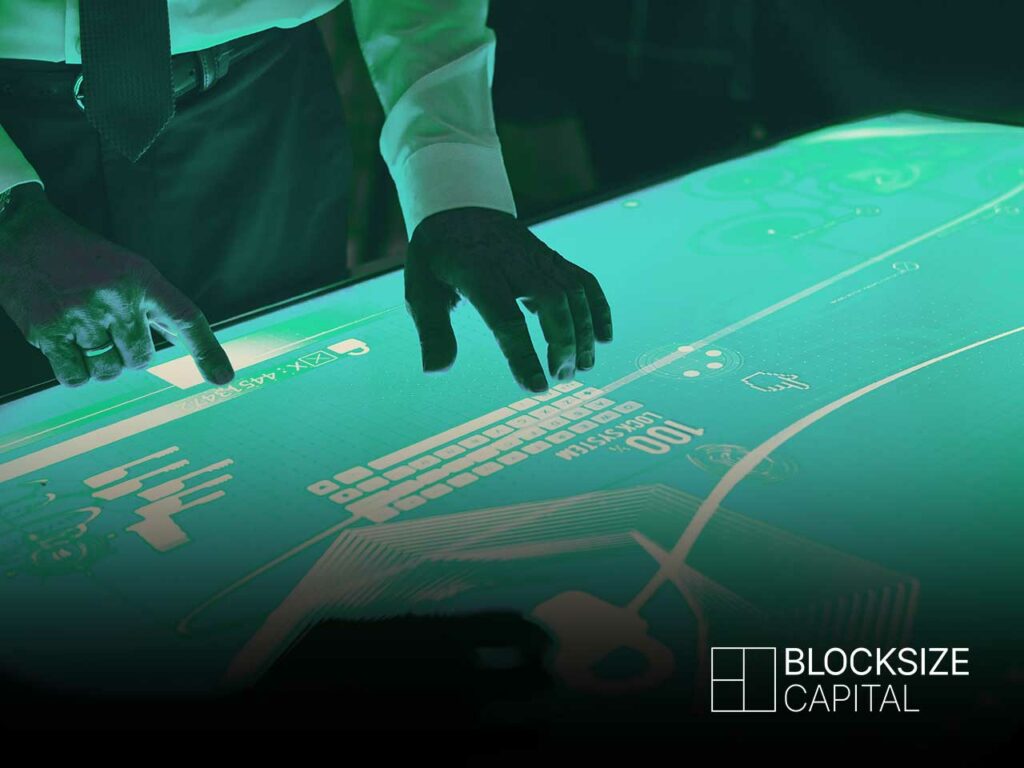Software as a Service in the Metaverse

by Dragan Djekov
Whether you’re informing yourself regularly about the world of blockchain and cryptocurrencies, or you are just getting started in this new age of fintech, the term “Metaverse” has probably popped up on a notification on your phone or article you read during the last couple of weeks.
We have introduced the term “Metaverse” for the first time in our last blog post, where we highlighted some of the latest developments surrounding this topic, as well as its connection and outlook regarding the current trading practices.
In this article, we are going to explore the current environment for software providers in particular. We believe that in the next couple of years there will be an upsurge in Software-as-a-Service providers that are going to migrate their user experience into the metaverse, opening up to a whole new realm of interactive possibilities. As a SaaS provider ourselves, we at Blocksize Capital are actively monitoring the latest developments, so as to cater to our institutional clients in the best possible way.
The Metaverse explained
A Metaverse, to put it more simply, is a space where users can participate in a shared virtual universe, for instance, interacting with each other or with data as avatars in a 3D space. It is seen as the next evolutionary step succeeding the internet, as we know it today.
The Metaverse allows people to interact socially, play games, buy online at e-commerce stores, conduct meetings or build company infrastructure, and more.
Virtual worlds have accompanied us for quite some time, beginning with movies, from games over to the first AR and customized 3D experiences online. But never has the utility and development reached heights as it has in the last weeks and months, concluding with Facebook creating a new corporate identity under the name “Meta”, taking a stance in the race of branding the term and strategically positioning in front of the concept of the Metaverse.
The Metaverse embodies the idea of one single virtual reality where users can visit museums, watch shows, create content or just shift their online experience and go to websites. So, while the Metaverse can be seen as an immersive version of the internet, it does and will consist of textures, dimensions, and colors.
Building the Metaverse
Considering the long road ahead (some essential Metaverse software solutions are still going to take five to ten years to be fully developed) when it comes to the realization of the ultimate Metaverse and the fact that some big companies are already capitalizing on the concept right now, it becomes clear that cooperation and open-source mentality is going to be demanded by the greats of the tech industry and upcoming software start-ups alike.
The imagination and developments of the near past are pointing towards the creation of a fully-fledged 3D Metaverse functioning as a virtual reality internet, accessible from various devices at any time of day with websites floating as spaces, NFT galleries, worlds made up of games, brands and more.
Based on this concept, the importance of functional technology, as well as decentralized structures come to mind. The Metaverse hereby seems like the perfect use case for cryptocurrency and blockchain technology, as well as the implementation of DeFi concepts considering the vast speed and gigantic transfers of data, digital ownership of NFTs or e-commerce products, and the wide spectrum of applications for the corporate world, which thus emphasizes the relevance of transparency and security in the Metaverse again.
As a result, digital ownership and cryptocurrencies can also be seen as some of the main pillars of the creation of a Metaverse, pointing us towards software start-ups and the essence of community building as two of the focal points in the developments of this concept.

Software as a service in the Metaverse
Currently, companies like Google, Facebook, and Microsoft are investing billions of dollars and huge amounts of human resources to pursue building the Metaverse, while we are also monitoring big brands like the NBA and TikTok shifting towards the NFT industry and helping creators develop content.
Pursuing these latest developments, we are now going to take a closer look at how software start-ups and their solutions are strengthening, as well as diversifying the structure of the Metaverse and how they can be seen as the fuel of the development-motor.
To begin with, let us assess the current state of the Metaverse by taking a glance at the current state of the companies that will play a major role in the creation of the Metaverse:
- Microsoft: According to Microsoft Corp’s CEO Satya Nadella, the company is building an “enterprise metaverse” converging digital and physical offerings. As Microsoft owns Xbox and the Metaverse’s favorite world-building game “Minecraft”, the company also represents a key player in the world of gaming. Xbox CEO Phil Spencer has been cited before talking about “a metaverse or mixed-reality construct”. Microsoft can thus be expected to deliver essential parts to the engine and development of the Metaverse.
- Roblox: Roblox is a video-game platform aiming to provide users and developers with the instruments to create digital worlds. The platform has its own virtual economy powered by its own currency, Robux. The company’s mission statement is to provide its users and developers with “millions of 3D experiences to learn, work, play, create and socialize” in. Although Roblox has only been public for a year, the vast development and rising numbers of users position the platform right in the centre of the developing concept of the Metaverse.
- NVIDIA: NVIDIA is known for dominating the computer-chip market and has already built a platform called “Omniverse” in order to connect 3D worlds into a shared virtual universe. Omniverse is currently used most oftenly for creating simulations of real-world buildings, factories and more. According to the company, the Omniverse can be described as the “plumbing” on which the Metaverse can be built, bridging the gap between 3D worlds and one shared virtual Metaverse.
- Autodesk: Autodesk is a cloud software company providing software used by architects and engineers to design and create buildings and products, as well as building virtual worlds for entertainment. Autodesk complements software solutions like Unity and Unreal Engine with a slightly different perspective.
- Snap: Snapchat owner Snap Inc. has been developing in the directions of custom avatars and augmented reality filters for quite some time now concluding with this year’s launch of the company’s first true augmented reality glasses created for developers in order to experiment and create new experiences for the product. Apart from the engine and functionality inside of the Metaverse, a big question also remains open in regards to how the users are going to participate and experience this virtual universe. Snap is definitely going to bring new and valuable insights in regard to this.
- Amazon: As the world’s largest cloud service vendor, the e-commerce giant, Amazon, has to be taken into consideration when it comes to the creation of a virtual universe, although it is yet to be expected, how exactly the company is going to pave its way into the Metaverse.
- Facebook: Mark Zuckerberg and the new corporate identity “Meta” are often described as the forerunners to the concept of the Metaverse. The company purchased VR start-up Oculus back in 2014 and created their first Oculus App called “Horizon Workrooms” in late August, enabling users to participate in meetings with avatars using the company’s VR headsets. “In the future, working together will be one of the main ways people use the metaverse,” Zuckerberg wrote in Meta’s announcement and mission statement. And Facebook looks to be up front in the race to realize these tools and make them market ready.
Why it’s the software and crypto start-ups’ turn now
The concept of one, omnipresent Metaverse could still be more than decades away from being realized and it is going to take cooperation among the giants of the tech industry and new start-ups on the scene alike.
What can be expected now, is the realization of gaining access, experiencing, and owning assets in the virtual universe which will be provided by the leaders and start-ups in the areas of software technology as well as product-orientated and hardware solutions.
Digital commerce is going to evolve into more immersive experiences with AR and VR, as well as various new critical tools to enhance gaming, designing, and development.
Blocksize Capital allows you to stay up to date with the most relevant developments in the world of fintech and cryptocurrencies, while at the same time providing a reliable and data-driven SaaS solution that helps you enter the digital asset market with full confidence and all the right tools at hand. Get in touch with us now and let us help you pick the right solution for trading and managing your digital assets.
